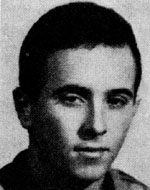Schechter, Nathan
Son of Shimon and Pnina. Born on February 19, 1945, in Herzlia, he studied at the Brenner elementary school and graduated from high school where he studied in high school. In his youth he had clear goals in life: to serve in the paratroopers and to study the medical doctrine, for he could serve the country and the inhabitants of the country. B. In August 1963 he was drafted into the IDF, enlisted in the paratroopers, underwent a paramedics course and a platoon commander course, and at the end of the course became a squad commander and then a sergeant. When he was released from the army, he worked and saved the money for studies and was then free to start in the second direction, and he was a member of the army. In the course of his life, he studied medicine, and he passed examinations at the university in Bologna and was accepted as a student in the Faculty of Medicine, and in addition to the difficulties of language and study, his longing for Israel also weighed on him. Dream-his life. In his letters to his parents, to his friend and friends, he expressed his yearning: “Italy is very Yaffa, but the country is more Yaffa …” The snow here is a real experience, but your sun is much more pleasant … “He began to return to Israel at the end of the school year, to marry his wife, and to save money for the continuation of his studies. In the land before the outbreak of the Six-Day War, Nathan found no rest, demanding that his Israeli friends return to Israel without delay and join the fighters, and his letters were filled with anxiety and anxiety about the house. “At that point Natan stood up and without a conscription came to Israel as a volunteer for the Medical Corps. During the war, on the third day of the fighting, he fell on a battle near the Rockefeller Museum, where bombs fell and many fighters were wounded, And was killed in a military bomb attack on Mount Herzl in Jerusalem, and after the fall, the students in Bologna decided to set up their club in his name, and the Department for Commemoration of the Soldier in the Ministry of Defense participated in the donation for this purpose. At the initiative of his medical friends in Bologna and the Jewish community there was a marble plaque in Hebrew and Italian at the entrance to the Jewish community building in the presence of one of his medical teachers, representatives of the community and the Israeli consulate. In the high school where he studied, the library was named after him. In the book “Marinas Gabro” of the Paratroopers Headquarters was devoted a page to his history and description of his last battle. His name was immortalized in Moshe Nathan’s book, “The War on Jerusalem,” and is recounted in the book “Jerusalem for Peace” by Eli Landau.
